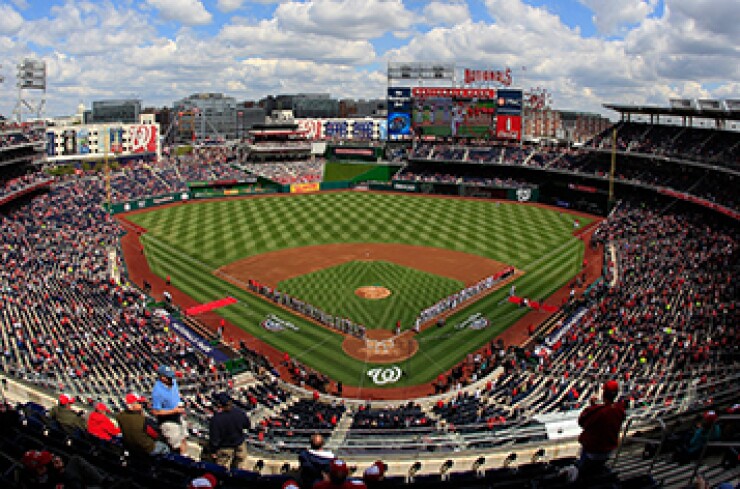
WASHINGTON – Rep. Steve Russell, R-Okla., has introduced a bill in the House that would prohibit the use of tax-exempt bonds to build or subsidize professional sports stadiums and for-profit entertainment arenas.
H.R. 4838, or the No Tax Subsidies for Stadiums Act, would prevent professional sports franchises and for-profit entities from seeking federal taxpayer financing toward stadiums, which Russell called a "30-year-old tax loophole."
The bill was introduced on March 22 and subsequently referred to the House Ways and Means Committee. There are no cosponsors as of yet.
In a statement, Russell said the Office of Management and Budget has estimated that repealing tax-exempt bond financing for stadiums would lower the budget deficit by a total of $542 million over the next decade.
Russell, who serves on the House Armed Services Committee, said that money could be used to fund the armed services. President Obama has moved to cut 40,000 soldiers and another 17,000 Army civilian employees due to "a difficult fiscal environment," Russell said.
"The No Tax Subsidies for Stadiums Act is a step in the right direction, for our national security, as well as for fixing our annual deficits," the congressman said in a release.
The bill would define a professional entertainment facility as a location that serves as either a stadium or arena for professional sports games or training and seats more than 100 people for at least five days of the year.
Russell's bill is not the first proposal to ban tax-exempt financing for stadiums.
Former Sen. Tom Coburn, R-Okla., also called for a ban on federal tax-exempt financing for sports stadiums in his Dec. 2014 "Tax Decoder" report. He argued against the technicality that local governments could use federal bonds to finance a stadium if taxpayers paid for nearly all of the interest. Under current law, a stadium can be built with tax-exempt bonds as long as no more than 10% percent of the debt service is paid or secured by private parties and no more than 10% of it is privately used.
"Congress should level the playing field and protect taxpayers by closing the stadium loophole entirely," Coburn wrote in the report. "Not a single dollar from tax-exempt municipal bonds should be used for these billionaires' bonanzas."
President Obama has also taken a stance against taxpayer financing for stadiums and arenas. In his fiscal 2016 and fiscal 2017 budgets, Obama proposed prohibiting tax-exempt bonds to be used for financing private sports facilities by eliminating the private payment test for them. As a result bonds would be taxable private-activity bonds if more than 10% of the facility was used by private parties. "When Senator Coburn and President Obama agree on a budget proposal, you know it is a necessary measure to work on," Russell said.
Since the Tax Reform Act of 1986, which prohibited tax-exempt private-activity bonds from financing stadiums, was enacted, Russell said professional sports franchises have taken advantage of "loopholes" to receive billions of dollars in tax subsidies.
Professional sports franchises, though collectively earning billions of dollars in revenue annually often seek federal, tax-free funding to finance the construction of new stadiums and arenas.
The issue of stadium financing has become a hot-button issue in recent years, as several franchises have said they need new stadiums or will have to relocate to other cities. The NFL's Atlanta Falcons are set to begin playing in the $1.4 billion Mercedes-Benz Superdome next season, roughly $200 million of which was financed with tax-exempt bonds, according to Coburn. The $1.2 billion Cowboys Stadium completed in 2009 was financed by governmental bonds, which Coburn said would cost $65 million in subsidies to investors over the next 65 years.
The Minnesota Vikings will soon begin playing home games at the $1 billion Vikings Stadium, roughly half of which was financed by tax-exempt bonds, Coburn said.
Critics complain tax-exempt bond financings of stadiums are an ineffective means of spending public funds and providing benefits mostly to teams, while supporters have stressed the added investments that such facilities can bring to regions.
Since 2006, 263 tax-exempt bond issues totaling $16.9 billion have been sold to finance stadiums and sports arenas, according to figures compiled by Thomson Reuters. That includes the five bond issues totaling $82.2 million have been reported thus far for 2016.
Dennis Zimmerman, the director of projects for the American Tax Policy Institute and former economist at the Congressional Budget Office, said Monday that although he has not yet seen Russell's bill, he is in favor of any legislation that would curtail federal, tax-exempt sports stadium funding.
"I think the federal government has no business subsidizing sports stadiums," Zimmerman said. "From a federal taxpayer's perspective – where's the advantage? No federal taxpayer gets a benefit from it."
Zimmerman said "we are wasting our money," when it comes to the federal funding, adding that it is very different than funding at the state or local level. The somewhat fixed cap on sports franchises, he said, provides little incentive for the federal taxpayer.
"I don't think it generates much economic activity," he said.
Former Sen. Daniel Moynihan, D-N.Y., proposed The Stop Tax-Exempt Arena Debt Issuance Act in 1996, which would have prohibited state and local governments from using tax-exempt bonds toward pro sports stadiums. That bill failed to pass in the Senate.





